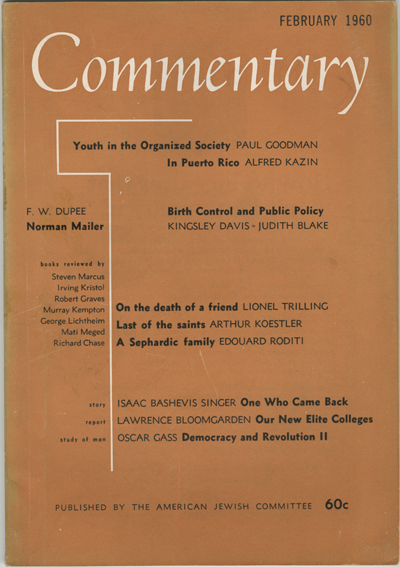

Author Morris Dickstein presents the lecture “America’s Best Magazine?: Commentary in the 1960s” this Thursday, April 18, at 7 p.m. at the Harry Ransom Center. In 2011, Commentary magazine donated its archive to the Center, and the collection is now open for research.
Founded in November 1945, shortly after World War II, Commentary was established to reconnect assimilated American Jews and Jewish intellectuals with the broader Jewish community and to bring the ideas of young Jewish intellectuals to a wider audience.
Throughout its history, Commentary has published significant articles on historical, political, cultural, and theological issues in addition to fiction and memoirs. The magazine became a major outlet for leading figures to establish their intellectual careers. The archive spans from 1945 to 1995 and consists mainly of editorial correspondence, galleys, other records, and correspondence with a number of writers whose archives reside at the Ransom Center, including Norman Mailer, Bernard Malamud, and Isaac Bashevis Singer.
Commentary underwent a dramatic shift in 1960 under the editorship of Norman Podhoretz, who applied more rigorous critical standards and made greater use of strong-minded New York intellectuals such as Irving Howe, Alfred Kazin, and Mailer. The magazine responded to all of the major controversies of the decade, from the Eichmann trial and the civil rights movement to the Vietnam War and the Columbia student uprising.
According to historian Richard Pells, Professor Emeritus at The University of Texas at Austin, “no other journal of the past half century has been so consistently influential, or so central to the major debates that have transformed the political and intellectual life of the United States.”
Dickstein is Distinguished Professor of English and Theatre at the CUNY Graduate Center. His most recent book, Dancing in the Dark: A Cultural History of the Great Depression, received the Ambassador Book Award in American Studies in 2010.
The event is free, but donations are welcome. Seating is limited. Line forms upon arrival of the first patron, and doors open 30 minutes in advance.
This program is co-sponsored by the Schusterman Center for Jewish Studies at The University of Texas at Austin. The Albert and Ethel Herzstein Charitable Foundation made a generous grant to support this program and the cataloging of the Commentary archive.